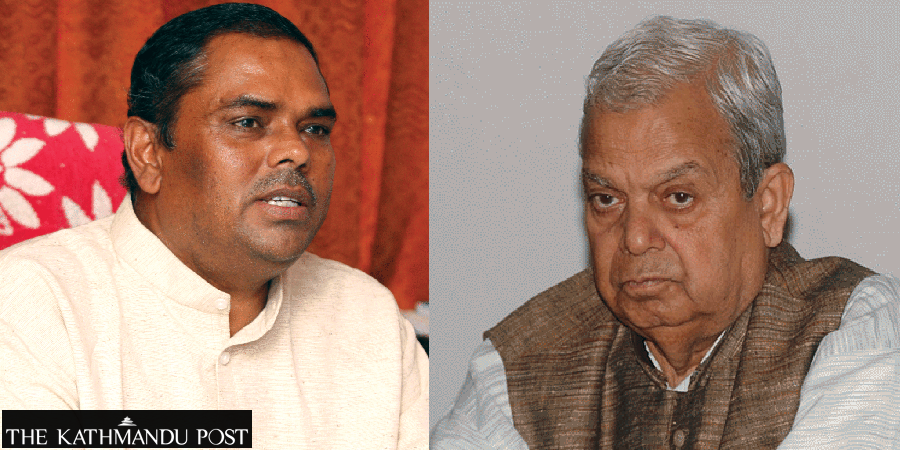Politics
Division in Madhesh forces darkens their electoral prospects
Two major parties in Madhesh pitted against each other will fare worse this time than in last elections, analysts say.
Purushottam Poudel
Two Madhesh-based parties led by Upendra Yadav and Mahantha Thakur fought the federal and provincial elections under an alliance in 2017 and won a considerable number of seats together. In Madhesh Province, the two parties even formed their own government.
The two parties eventually became one, ending the series of splits that plagued the regional forces for long. Their unity, however, did not sustain. For one thing, the union had a shaky foundation and then there were other reasons like the faction presently called Loktantrik Samajbadi Party joining the government led by KP Sharma Oli.
Yadav’s faction of the Janata Samajbadi Party had been protesting against Oli’s move of dissolving the House of Representatives, together with the Nepali Congress, the CPN (Maoist Centre) and Madhav Nepal faction of Oli’s party CPN-UML.
This alliance was thought, until recently, to fight the November elections together, leaving Oli’s party to side with some fringe forces. Until last week, the Loktantrik Samajbadi Party (LSP) was left out of the Congress-led coalition. It was only after Yadav quit the alliance to side with the UML that the LSP took the chance to forge a deal with the coalition led by Sher Bahadur Deuba, the prime minister and Congress president.
The LSP secured only seven House of Representatives candidacies from the Congress. The Janata Samajbadi (JSP), which quit the Deuba-led alliance voicing dissatisfaction with the number of seats offered, reached a deal with the UML just in time for candidacy nomination.
In partnership with the UML, the JSP has fielded 32 candidates for the provincial elections and 17 for the federal parliament. Apart from the House seats, the LSP got 16 provincial assembly seats in a deal with the ruling alliance.
According to experts and observers, the JSP has a slim chance of retaining its top position in Madhesh, but the LSP stares at an even poorer performance.
“I doubt the LSP will reach the 3 percent vote threshold to become a national party after the November polls,” Tula Narayan Shah, a Madhesh observer, told the Post. Given the number of candidates it has fielded in the federal and provincial elections, the LSP has a high chance to be confined to a regional party, he added.
Despite its waning influence in national politics, the JSP still holds the prospect of becoming a dominant force in Madhesh, analysts say. That was also the reason why Upendra Yadav, the JSP chair, abruptly left the governing coalition and joined the UML.
Madhesh commentator Sohan Shah, however, argues that the JSP changing its alliance will have little effect on the ruling alliance’s electoral outcome.
In the local level elections held in May, the Congress won 46 top positions in the 136 local federal units in Madhesh Province. The UML won only 30 mayors or rural municipality chairs in total. JSP candidates secured 25 top positions of local governments. While the LSP won 14 units, the Maoist Centre took nine top seats, and the CPN (Unified Socialist) led by Madhav Nepal six.
“If we look at the results of local elections, Nepali Congress looks strong in Madesh Province,” Tula Narayan Shah said. “The Congress-led alliance might muster a good number of seats in Madhesh Province.”
Put together, the ruling alliance commands 75 units in Madhesh Province whereas the UML-JSP bloc leads 55 units. The remaining six local units are managed by other small parties.
Beset by splits, and other forces being stronger, Madheshi parties have many challenges to overcome in the elections. According to Sonal Shah, the commentator, Madheshi parties did well in the elections only after the 2006 people’s movement, in the 2008 Constituent Assembly elections. Yadav’s Madhesi Janadhikar Forum then spearheaded a movement against the nation’s established forces. Yadav is also credited with federalising the country with the mandate of the 2006 people’s movement and the Madhesh Movement that he led. However, much water has flown under the Koshi bridge since. Traditional forces have already regained their lost space in the province.
Madheshi leaders competing against each other will also diminish their chances of being elected to the House of Representatives, compared to the 2017 elections, analysts say. For instance, in Saptari-2, Upendra Yadav is challenged by CK Raut. In Dhanusa-3, Anil Kumar Jha from the LSP will face the CPN-UML’s Juli Mahato. In Sarlahi-2, Rajendra Mahato of the LSP will take on Mahendra Ray Yadav. The majority of them previously represented Madhesh in parliament.
In the 2017 federal and provincial elections, the Sanghiya Samajbadi Forum and Rastriya Janata Party, led by Yadav and Thakur, respectively, before their merger in 2021, campaigned together to win 21 first-past-the-post seats in federal parliament.
After their disintegration in July last year, Yadav retained the JSP, while Thakur founded the LSP. There have not been serious efforts at reunion again.




 24.09°C Kathmandu
24.09°C Kathmandu













